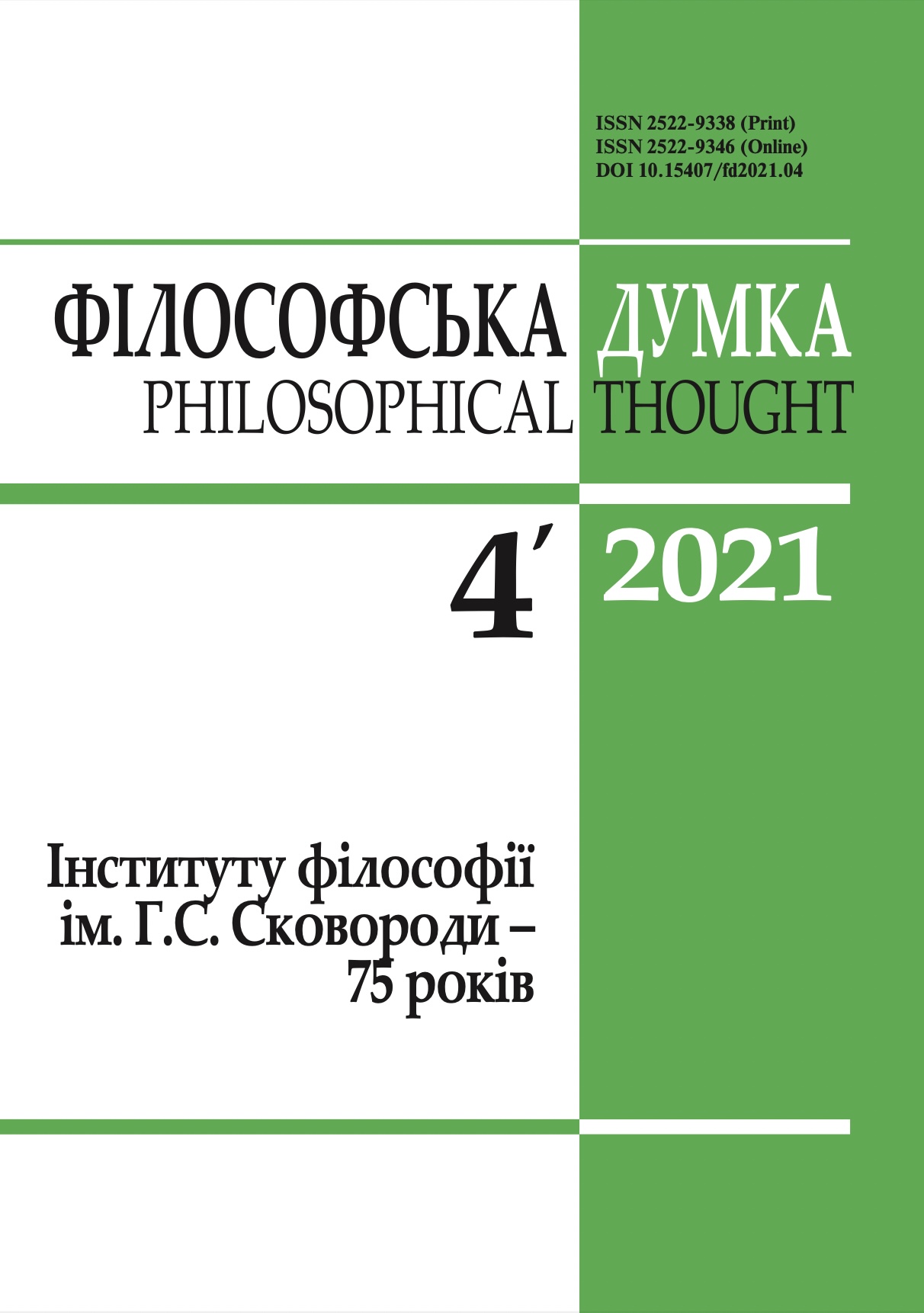Will and Volition: Personal Conditions of Possibility of Being an Agent
ANALYTICAL PHILOSOPHY
DOI:
https://doi.org/10.15407/fd2021.04.153Keywords:
will, volition, agency, rationality, normativityAbstract
Will is a very old important philosophical concept, an analysis of which is very specific, if not odd, comparatively with the others (when it fruitfully proceeds in terms of criteria). This concept (‘will’) is going to be used to provide and clarify conditions of possibility for person of being an agent. In doing that I refer to the correspondent pieces of Wittgenstein’s Tractatus and Philosophical Investigations; and to their interpretations by M. Alvarez in “Wittgenstein on Action and Will” (2009) and D. K. Levy in “Morality without Agency” (2017). Person is essentially constituted by ‘powerless’ will in terms of ‘understanding’ that is experienced during her life. Action depends on and manifests understanding by will of a personal attitude to some states of affairs. Will does not incline a person to particular desires about preferable states of affairs or actions. Will is not about states of affairs. By willing I value the world, its portions, they appear significant, important to me. Volition is treated as related to will. Both are personal conditions of being an agent with priority of agency as capacity realized by rational actions.
References
Alvarez, M. (2017) Wittgenstein on Action and Will. In: H.-J. Glock, J. Hyman (Eds.), Companion to Wittgenstein (pp. 491-501).
https://doi.org/10.1002/9781118884607.ch31
Anscombe, G.E.M. (1957). Intention. Oxford: Blackwell.
Ayer, A.J. (1956). I think, therefore I am. In: A.J. Ayer, The Problem of Knowledge (pp. 44-52). London: MacMillan.
Beall, J.C. (2006). Modelling the "Ordinary View". In: P. Greenough, M.P. Lynch (Eds.), Truth and Realism (pp. 61-74). Oxford: Clarendon Press.
https://doi.org/10.1093/acprof:oso/9780199288878.003.0004
Boghossian, P. (2006). What is Relativism? In: P. Greenough, M. P. Lynch (Eds.), Truth and Realism (pp. 13-37), Oxford: Clarendon Press.
https://doi.org/10.1093/acprof:oso/9780199288878.003.0002
Dancy, J. (2004). Ethics without principles. New York: Clarendon Press, Oxford.
https://doi.org/10.1093/0199270023.001.0001
Hyman, J. (2015). Action, Knowledge, and Will. Oxford: Oxford University Press.
https://doi.org/10.1093/acprof:oso/9780198735779.001.0001
Laktionova, A. (2015). "Cogito Ergo Sum" and Philosophy of Action. [In Ukrainian]. Sententiae, 32(1), 88-99. [=Лактіонова 2015].
https://doi.org/10.22240/sent32.01.088
Laktionova, А.V. (2016). Performative Normativity in Epistemology and Ethics. Софія. Гуманітарно-релігієзнавчий вісник, 2(6), 92-95.
Levy, D.K. (2009). Morality without agency. In: E. Zamuner, D.K. Levy (Eds.), Wittgenstein's Enduring Arguments (pp. 262-280). London, New York: Routledge.
Greenough, P., Lynch, M.P. (Eds.) (2006). Truth and Realism. Oxford: Clarendon Press.
https://doi.org/10.1093/acprof:oso/9780199288878.001.0001
Wittgenstein, L. (1922). Tractatus Logico-Philosophicus. London: Routledge and Kegan Paul.
Wittgenstein, L. (1951). Philosophical Investigations. Oxford: Basil Blackwell.
Wright, C. (2006). Intuitionism, Realism, Relativism and Rhubarb. In: P. Greenough, M.P. Lynch (Eds.), Truth and Realism (pp. 38-60). Oxford: Clarendon Press.
Downloads
-
PDF
Downloads: 288
Published
How to Cite
Issue
Section
License
Authors who publish with this journal agree to the following terms:
- Authors retain copyright and grant the journal right of first publication.
- Authors are able to enter into separate, additional contractual arrangements for the non-exclusive distribution of the journal's published version of the work (e.g., post it to an institutional repository or publish it in a book), with an acknowledgement of its initial publication in this journal.
- Authors are permitted and encouraged to post their work online (e.g., in institutional repositories or on their website) prior to and during the submission process, as it can lead to productive exchanges, as well as earlier and greater citation of published work (See The Effect of Open Access).


